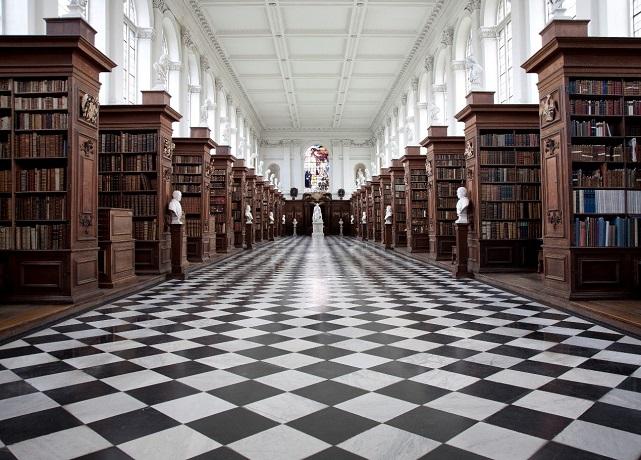The Festival is part of the national Heritage Open Days scheme, which has chosen the theme ‘creativity unwrapped’ for 2023. The idea is to offer everyone the chance to see places they normally would not be able to and to try out new experiences – and it’s all FREE.
There is plenty to see and do to keep history buffs and culture lovers busy during the festival period, including visiting some of the city’s most iconic landmarks. The following is a guide to all things unmissable during the 10 days.
One of the most outstanding places to see for anyone living in or visiting Cambridge is the Grade 1 listed Wren Library at Trinity College. This is where you can find Isaac Newton's first edition copy of Philosophiae Naturalis Principia Mathematica and AA Milne's manuscript of Winnie-the-Pooh and The House at Pooh Corner among many other notable books too numerous to mention. The Library also houses handwritten notes by Robert Oppenheimer describing the ‘Trinity’ atomic bomb test in New Mexico, US, and a collection of autograph poems by John Milton.
The stunning Library is one of Christopher Wren’s great masterpieces of architecture. 2023 commemorates the 300th anniversary of his death. As part of Open Cambridge, the Library presents a special exhibition, Exploring Wren: Wren Library open day (every day during the Festival period except Sundays) looking at how he designed and created the space. Also on show are treasures from the priceless collection demonstrating art, literature and the sciences, covering all elements of creativity. This is really is a must-see!
Book and architecture lovers will be in their element when the Parker Library at Corpus Christi College also open their doors on Saturday 9th September. The Parker Library is one of the greatest national heritage treasures. It is internationally renowned for its important collection of medieval and renaissance manuscripts, as well as its valuable holdings of early printed books. It is one of the most significant surviving renaissance libraries in Europe.
Visitors will have a chance to see the old library and view the current exhibition: ‘Anchorless Bodies: Navigating Arabic in Medieval Manuscripts with new work by Emii Alrai’. There will be demonstrations of how manuscripts were assembled and are conserved today by the Cambridge Colleges’ Conservation Consortium. As the College celebrates this year the start of ‘40 Years On: Women of Corpus’, the Archives will also have an exhibition on display for one day only.
And if that’s not enough, the Whipple Library offers visitors the opportunity to see some of the treasures from their own rare book collection during 500 years of Science in Print (8 Sept). The fascinating exhibition features some of the earliest Western Scientific books, works by Darwin, Galileo, Newton and more, and (possibly) the smallest scientific book ever printed. The museum's collection is 'designated' by the Museums, Libraries and Archives Council (MLA) as being of ‘national and international importance’.
In terms of art, there are several remarkable exhibitions, not least Gurpran Rau’s Patterns of Renewal at Wolfson College on 9th, 10th and 17th September. The paintings were inspired by her walks in the woods of Cambridgeshire during the challenging days of lockdown.
Commenting on her new work, Gupran Rau said: “I was fascinated by the ephemeral dance of light and shadow on the forest floor, as sun-dappled patterns emerged and faded revealing nature's exquisite choreography. Drawing from the repetitive and intricate patterns I observed underfoot – the harmonious intermingling of organic forms with shadows and sunlight, I combined layers of paint and other media creating a new and vibrant terrain. Using a reductive process, I let the paint reveal what lay beneath, echoing the wild and beautiful paths I traversed. For me, the forest floor is like a tapestry: highly patterned, alive, chaotic, mysterious, and beautiful all at the same time.”
It’s no exaggeration to suggest that the finest theatre space in Cambridge is the Howard Theatre at Downing College. For Open Cambridge, two special screening of Ian Giles’ early films, After BUTT + Trojan Horse/ Rainbow Flag (10 Sept) are set to be shown at in this uniquely beautiful theatre. While 'After BUTT' celebrates the pulpy and irreverent gay magazine BUTT, which ‘put the sex back in homosexuality’ for a community emerging from the shadows of two decades of the AIDS epidemic, ‘Trojan Horse/Rainbow Flag’ looks at the disappearance of gay spaces like the iconic Joiner's Arms in London due to gentrification. Ian Giles' work has recently been exhibited at the Whitechapel Gallery, Kettle’s Yard, Firstsite, and the Stedelijk Museum. His performances, filmmaking, and social practice create new networks to record and celebrate LGBTQI+ histories and experiences.
On the topic of theatre and performance, there are several that really should not be missed, including the exciting new dance work by Lucy Suggate, Tender Stones (16 Sept), an artistic and poetic exercise in making stone, inspired by Pembroke College’s original site.
Zoe Smith, Open Cambridge Coordinator, said: “I can’t wait for Open Cambridge to begin next week! These highlights are a very small selection of the truly fascinating events on offer this year. I’m delighted that so many have embraced the opportunity to tell their stories about the history, heritage and culture of Cambridge and Cambridgeshire. There’s so much for people to enjoy and learn no matter what their age. It’s a wonderful opportunity to explore and celebrate our city and county.”



